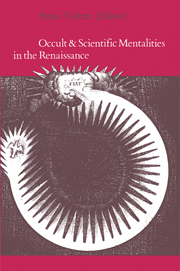Book contents
- Frontmatter
- Contents
- List of contributors
- Editor's preface
- Introduction
- 1 At the crossroads of magic and science: John Dee's Archemastrie
- 2 The occult tradition in the English universities of the Renaissance: a reassessment
- 3 Analogy versus identity: the rejection of occult symbolism, 1580–1680
- 4 Marin Mersenne: Renaissance naturalism and Renaissance magic
- 5 Nature, art, and psyche: Jung, Pauli, and the Kepler–Fludd polemic
- 6 The interpretation of natural signs: Cardano's De subtilitate versus Scaliger's Exercitationes
- 7 Kepler's attitude toward astrology and mysticism
- 8 Kepler's rejection of numerology
- 9 Francis Bacon's biological ideas: a new manuscript source
- 10 Newton and alchemy
- 11 Witchcraft and popular mentality in Lorraine, 1580–1630
- 12 The scientific status of demonology
- 13 “Reason,” “right reason,” and “revelation” in midseventeenth-century England
- Index
9 - Francis Bacon's biological ideas: a new manuscript source
Published online by Cambridge University Press: 12 January 2010
- Frontmatter
- Contents
- List of contributors
- Editor's preface
- Introduction
- 1 At the crossroads of magic and science: John Dee's Archemastrie
- 2 The occult tradition in the English universities of the Renaissance: a reassessment
- 3 Analogy versus identity: the rejection of occult symbolism, 1580–1680
- 4 Marin Mersenne: Renaissance naturalism and Renaissance magic
- 5 Nature, art, and psyche: Jung, Pauli, and the Kepler–Fludd polemic
- 6 The interpretation of natural signs: Cardano's De subtilitate versus Scaliger's Exercitationes
- 7 Kepler's attitude toward astrology and mysticism
- 8 Kepler's rejection of numerology
- 9 Francis Bacon's biological ideas: a new manuscript source
- 10 Newton and alchemy
- 11 Witchcraft and popular mentality in Lorraine, 1580–1630
- 12 The scientific status of demonology
- 13 “Reason,” “right reason,” and “revelation” in midseventeenth-century England
- Index
Summary
In the past few years a couple of unprecedented events have taken place in the normally rather quiet field of Bacon studies. Several hitherto unknown Bacon manuscripts, the most substantial ones to have come to light since the seventeenth century, have been identified. In addition to that, a whole new branch of Bacon's philosophy, the branch I have called the “speculative philosophy,” has been discovered and put together again. These two developments turn out to be mutually reinforcing. The new manuscripts tell us a lot about the speculative philosophy, and what we already know about the speculative philosophy from the printed sources helps us to make sense of the manuscript materials – materials that promise to give us new insights into the growth, scope, and character of the speculative philosophy itself.
Until recently it was generally believed that the canon of Bacon's work had been substantially established by the great Victorian editors Spedding, Ellis, and Heath. But in 1978 an unpublished natural-philosophical manuscript was found in the British Library (Additional Manuscripts 38,693, fols. 29r–52v). A transcription of and commentary on this piece was published in 1981. However, that discovery was quite overshadowed by findings made by Dr. Peter Beal in the course of his researches for the monumental Index of English Literary Manuscripts. Beal discovered a manuscript copy of an unknown fragment, Historia et inquisitio de animato et inanimato, a copy (possibly complete) of the Abecedarium novum naturae, and a 13,500-word Latin manuscript on biological topics.
- Type
- Chapter
- Information
- Occult Scientific Mentalities , pp. 297 - 314Publisher: Cambridge University PressPrint publication year: 1984
- 3
- Cited by



